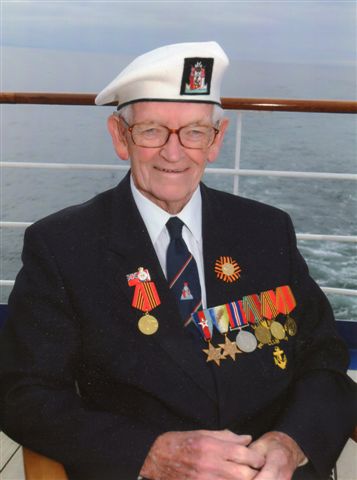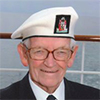David’s story was one of several told in Arctic Convoys, a past exhibition at the National War Museum about the oceangoing convoys of merchant and military ships that provided an essential lifeline to the Russians in their fight against Germany in the Second World War.
In the Supplement to the London Gazette of Friday 8th October 1943 there was a list of names of nineteen Merchant Navy Officers and Men; five were given the Order of the British Empire and fourteen were given King’s Commendations for brave conduct. The citation read, very simply, “For dangerous work in hazardous circumstances”.
I feel that the story should be told about why the names of these men appeared in the London Gazette. I write the story as I remember it but I write on behalf of the nineteen men, as we all worked together and none of us did anything different from the others.
On 13th January 1943 I joined the SS Dover Hill at anchor off Gourock in the Clyde. I had signed on as Radio Officer and, on going on board ship, discovered that we were bound for North Russia. We were heavily loaded with Fighter Aircraft, tanks, guns lorries and a large tonnage of shells and high explosives. Our deck cargo was made up of lorries in cases, Matilda tanks and drums of lubricating oil covered with a layer of sandbags, presumably to protect them from tracer bullets. Needless to say we were not very happy about this last item.
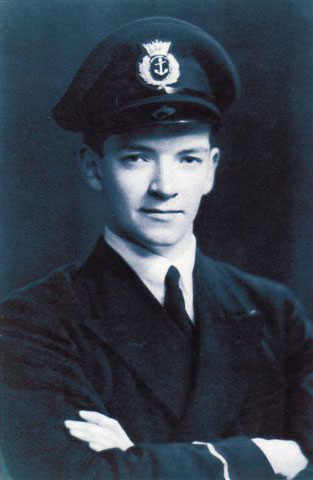
We left the Clyde on 23rd January and arrived in Loch Ewe on the 25th, where we lay at anchor until the rest of the merchant ships had gathered for our convoy. Loch Ewe is a very beautiful place to visit in the summer but in January/February, with a North Westerly gale blowing and a few, large, heavily laden merchant ships dragging their anchors, it could get a bit hectic at times.
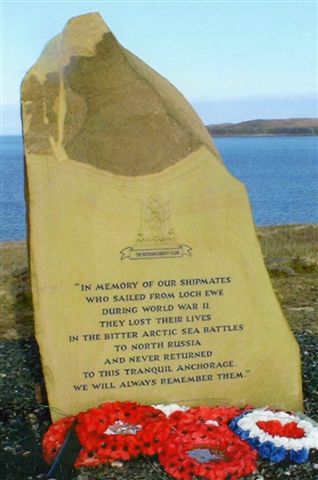
On 15th February twenty-eight merchant ships set out in a gale for North Russia in the heavily defended Convoy No.JW 53. The escort was made up of three cruisers, one anti-aircraft cruiser, one escort carrier, sixteen destroyers, two minesweepers, three corvettes and two trawlers, which was a very good escort, and as the daylight hours were getting longer, trouble was obviously expected.
Due to having to maintain absolute wireless silence, the Radio Officers stood their watches on the bridge with the Navigation Officers on duty.
As we sailed North the gale developed into a hurricane and ships began to get damaged. One of our cruisers, HMS Sheffield, had the top of her forward gun turret torn off and our escort carrier, HMS Dasher, and six of the merchant ships were damaged and had to return to Iceland. On our ship the deck cargo began to break adrift and we were not sorry to see the oil drums going over the side, but when the lorries in wooden cases were smashed up and eventually went overboard things were not so good. However, we managed to save the tanks and kept on battering our way northwards.
I remember trying to use an Aldis lamp from our bridge to signal to a Corvette and found it very difficult since one minute she would be in sight, then she would go down the trough of the wave and all I could see would be her top masts; then up she would come and our ship would go down and all that could be seen was water, but eventually we got the message through. At one stage the convoy was well scattered but as the weather moderated the Navy rounded us all up and got us into some semblance of order once again.
The loss of our escort carrier meant that we had no air cover and, as expected, a few days later a German spotter plane arrived and flew round the convoy all the daylight hours to keep an eye on us. The next day we had a heavy attack by JU 88 bombers in which our ship was damaged and our gunlayer was wounded by bomb splinters, but we still kept plodding on towards North Russia. At this part of the voyage we were steaming through pancake ice floes which protected us from the U-boats, which could not operate in these conditions. The blizzards when they came were always welcome as they hid us from the enemy.
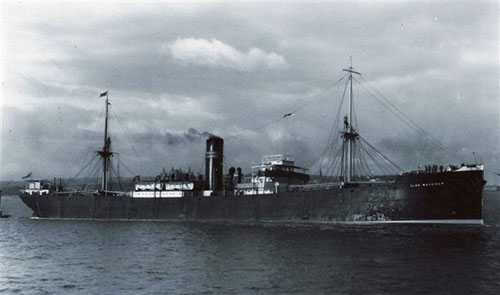
Two days later, on 27th February, we arrived at the entrance to the Kola Inlet, which is a long fiord with hills on either side and the town of Murmansk situated near the top. We had not lost any ships to the enemy and I must pay tribute to the good job done by the Royal Navy and our own D.E.M.S and Maritime Regiment Gunners on the merchant ships. Of the twenty-two merchantmen in our convoy, fifteen were bound for Murmansk and the remaining seven went on to the White Sea ports near Archangel. Little did we know at this time that we would not leave Russia until the end of November. The Navy ocean-going escorts which had taken us to the Inlet would now refuel and set off homeward with the empty ships from the previous convoy.
We were all very tired when we arrived because for the last few days we had either been on duty or at action stations for most of the time. So after picking up the Russian Pilot and setting off independently up the Kola Inlet we were looking forward to having a good sleep when we anchored near Murmansk. We were very quickly disillusioned when, about a mile up the Inlet, we passed a merchant ship on fire and her crew taking to the lifeboats. On asking the Pilot about the ship, which was from the previous convoy, he cheerfully told us that on the way down to meet us he had seen it being attacked by aircraft, obviously a common occurrence. We now understood why we had been fitted with so many Oerlikon and Bofors anti-aircraft guns to enable us to defend ourselves.
After two days at anchor we went alongside at Murmansk to discharge our cargo. The port was being bombed a good part of the time and one of our ships, the Ocean Freedom, was sunk alongside the quay near to us.
When we had discharged all our cargo we moved out and anchored about a mile apart on each side of the Inlet. We happened to be on the side nearest the German lines, which were only about ten miles away, and we were regularly attacked by ME 109 fighter bombers, which used to come over the top of the hill, down the side and come tearing at us about twenty to thirty feet above the water and would drop their bombs as they flew over us just above our top masts. Our gunners were very skilled and used to open fire only when the planes came well within range. These attacks only lasted for about a minute but were very vicious and we had gunners wounded and damage again done to our ship. We shot one plane down into the Inlet and on another occasion we damaged one which got out of range before we could finish it off. The next ship anchored astern of us opened fire when the damaged plane came within range and it blew up. We only got a half credit for this one so ended up with one and a half swastikas painted on our funnel.
We now come to the incident whereby, to our surprise, our names appeared in the London Gazette.
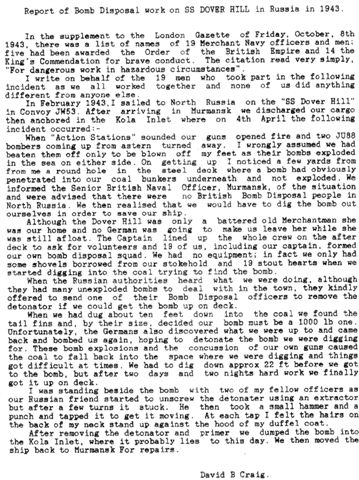
On Sunday 4th April we were anchored in Misukovo Anchorage a few miles north of Murmansk and I was playing chess in the Officers’ mess when Action Stations sounded and our guns opened up at the same time. I went through the pantry, looked out of the door, and saw two JU88 bombers coming up from astern, high up. Our Bofors shells were bursting below them and when they turned away I assumed we had beaten them off and stepped out on deck. This was a foolish thing to do as, unknown to me, the planes had released their bombs before turning away.
Four bombs exploded close on the port side and one on the starboard side and I was blown off my feet. As I got up our gunlayer came down from one of the bridge oerlikons and pointed out a large round hole in the steel deck a few yards from where I had been standing. It was obvious that the sixth bomb had gone through the main and tween decks into our coal bunkers and had not exploded. We informed the S.B.N.O, Murmansk of the situation and were advised that there were no British Bomb Disposal people in North Russia. We then realised that we would have to dig the bomb out ourselves in order to save our ship.
The minesweeper HMS Jason was ordered to anchor astern of us and to come alongside to render assistance if the bomb should explode, although I doubt if there would have been much to pick up. You must understand that though the Dover Hill was only a battered old merchantman she was our home and no German was going to make us leave her while she was still afloat.
The Captain lined the whole crew up on the after deck and asked for volunteers, and nineteen of us including our Captain formed our own Bomb Disposal Squad. We had no bomb disposal equipment, in fact we only had a few shovels borrowed from our stokehold and nineteen stout hearts when we started digging back the coal, trying to find the bomb. The bunker was full of good British steaming coal which we were saving for the homeward run so we used a derrick to bring it up on deck, hoping to replace it when we got the bomb out. When the Russian authorities heard what we were doing, although they had many unexploded bombs to deal with in the town, they kindly offered to send one of their Bomb Disposal officers to remove the detonator if we could get the bomb up on deck.
When we dug about ten feet down into the coal we found the tail fins and, by their size, decided our bomb must be a 1000lb one. Unfortunately the Germans also discovered what we were up to and came back and bombed us again, hoping to set off the bomb we were digging for. Between bomb explosions and the concussion of our own guns the coal kept falling back into where we were digging and things got difficult at times.
We had to dig down approximately twenty-two feet before we got to the bomb, but after two days and two nights hard work we finally got it up on deck.
I was standing beside the bomb with two of my fellow officers as our Russian friend started to unscrew the detonator when after a few turns it stuck. He then took a small hammer and a punch and tapped it to get it moving. I can honestly say that every time he hit it I could feel the hairs on the back of my neck standing up against my duffle coat hood. After removing the detonator and primer we dumped the bomb into the Kola Inlet, where it probably lies to this day. We then moved back to Murmansk for repairs.
Of the fifteen ships which had come to Murmansk in February, one had been sunk and four damaged. On 17th May, in company with three other ships, we left the Kola Inlet and set out for the White Sea. We arrived in Economia on the North Dvina River where we stayed until 18th July when we moved to Molotovsk (Severodvinsk) and finally on 26th November, with eight other ships, some damaged, we set out for home.
Since it was now dark for almost twenty-four hours each day and we could only do seven knots maximum speed we went north to the edge of the ice. Knowing that a Russian-bound convoy was coming up to the south of us we expected the Germans to attack it and leave us alone. This in fact happened and we eventually arrived in London on 14th December 1943, in time to be home for Christmas.
The time spent in the White Sea area was mostly peaceful but our main problem was lack of food and for part of the time we suffered from malnutrition, but we survived. I do not think it did us any harm as it makes us appreciate all the more the peaceful times we now live in.
When we sailed up London River towards Surrey Commercial Docks to pay off, with our Red Ensign flying and patches on our decks and side, we were proud of the old ship as if she had been a spick and span Navy vessel arriving in port. Incidentally, the Red Ensign had a hole in it where an Oerliken shell had gone through it during the fighting but it was the only one we had left.
After returning from North Russia, the Dover Hill was taken over by the Ministry of War Transport and was sunk at Arromanches on 9th June 1944 along with other ships to form an artificial port for the invasion of Normandy.
To finish on a personal note, I was the youngest of the young squad who took part in the incident in Misukovo Anchorage, having had my eighteenth birthday on the way up to Russia. I was no greenhand however, having joined my first ship in Plymouth as a Cadet in 1940 when I was fifteen years and three months old. Due to having a problem with my eyesight I was unable to continue in the Navigation Department and came ashore, went to the Wireless College and then returned to sea in the Radio Department.
I first returned to Murmansk in 1980, mainly to find the grave of a friend who had been killed in the port by a bomb splinter which went through his steel helmet. With the help of the Russian authorities I was able to do so. I went back in 1985 and again in 1987 with a group of veterans and we had great kindness and friendship shown to us by the people of Murmansk, who greatly appreciate the help we brought to them during the war. In 1987 I found out that the name of the Russian Bomb Disposal officer was Panin, and I later discovered from friends at the Northern Naval Museum in Murmansk that he had been killed in August 1943 in a dog fight with German aircraft over the Barents Sea.
I have since returned to Murmansk in 1991, 93, 95, 2001, 2005, 2010 and 2012. On various occasions I have taken part in the Victory Celebrations to mark the anniversary of the end of the war in Europe.
